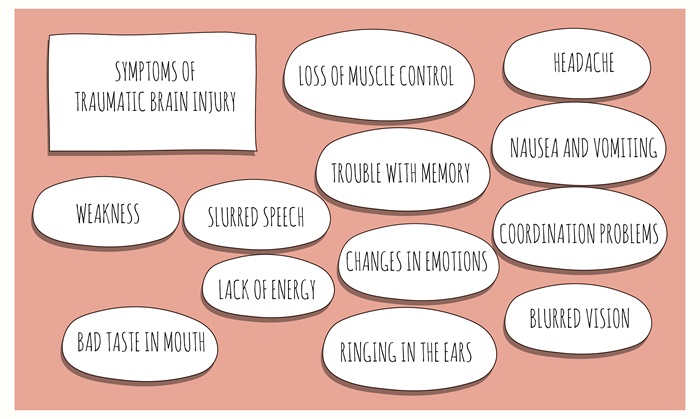Traumatic brain injury (TBI) is a potentially severe health issue that affects millions worldwide each year. This type of injury can have long-lasting effects on an individual’s physical, cognitive, and emotional well-being. In this comprehensive guide, we’ll explore the various aspects of traumatic brain injury, including its causes, symptoms, diagnosis, treatment options, and long-term effects.
Traumatic brain injury (TBI) is a disruption in normal brain function caused by a bump, blow, or jolt to the head. It can also result from a penetrating head injury. TBI can range from mild (commonly known as a concussion) to severe, potentially leading to long-term complications or death.

Traumatic brain injury symptoms depend on the severity and site of the injury. They may appear immediately after the injury or develop over time.
Diagnosing TBI involves a combination of clinical assessment and imaging studies. The process typically includes:
Early & accurate diagnosis is crucial for appropriate treatment and management of TBI.
Treatment for traumatic brain injury varies based on the severity of the injury and may include:
Immediate emergency care: To ensure proper oxygen supply, blood flow, and blood pressure
Traumatic brain injury treatment often requires a multidisciplinary approach involving various specialists working together to address the complex needs of TBI patients.
It’s important to note that with proper care and rehabilitation, many individuals with TBI can make significant improvements and lead fulfilling lives, says Dr. Shiva Kumar.
For many individuals and their families, living with TBI becomes a new reality that requires adaptation and support:
It’s crucial to remember that each TBI case is unique, and recovery paths can vary widely. Patience, perseverance, and a robust support system are key elements in navigating life after a traumatic brain injury.
Traumatic brain injury is a complex condition that can have huge effects on an individual’s life. From mild concussions to severe damage to brain tissues, TBI presents a spectrum of challenges for patients, families, and healthcare providers. Understanding traumatic brain injury causes, symptoms, and treatment options is crucial for early intervention and optimal recovery.
As research in neuroscience and rehabilitation continues to advance, new treatments and therapies offer hope for improved outcomes for TBI patients. However, prevention remains the best strategy. By raising awareness about TBI and implementing safety and preventive measures, we can work towards reducing the incidence of these life-altering injuries.
For those living with TBI, it’s important to remember that recovery is often a journey rather than a destination. With proper care, support, and determination, many individuals with TBI can make significant strides in their recovery and lead fulfilling lives.
TBI is damage to the brain tissues resulting from external mechanical force, such as a blow, jolt, or penetrating object. Common types include concussions, contusions, diffuse axonal injuries, and penetrating injuries. TBIs can range from mild (like a brief change in mental status) to severe (involving extended periods of unconsciousness or memory loss).
Recovery after a traumatic brain injury is possible. Still, the extent and speed of recovery greatly depend on the severity of the injury, the area of the brain affected & the individual’s overall health. Many people with mild TBI (concussions) recover fully within weeks or months. For moderate to severe TBI, recovery can be a long-term process, potentially lasting years, with some effects possibly being permanent. However, with proper treatment and rehabilitation, significant improvements are often possible.
Traumatic brain injury effects can include:
The specific after-effects depend on the severity and location of the injury and can vary widely between individuals.
The duration of a traumatic brain injury’s effects can vary significantly. For mild TBI (concussion), symptoms typically resolve within a few weeks to a few months. However, some individuals may experience post-concussion syndrome, where symptoms persist for months or even years. For moderate to severe TBI, effects can be long-lasting or permanent, with recovery potentially continuing for years after the initial injury. The recovery process is highly individual, and ongoing medical care and rehabilitation can help manage long-term effects.
Categories: Neurology
Traumatic Brain Injury is available for appointments. Please fill the below form to book an appointment.
|
> Neurology Specialists in Davanagere |
|
Unlock the door to exceptional healthcare, book an appointment with SPARSH Hospital and let your journey to wellness begin.